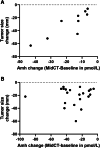AMH decline during chemotherapy reflects breast cancer cell DNA damage response (DDR) proficiency: the ONCO AMH1 pilot study
- PMID: 40220108
- PMCID: PMC12167210
- DOI: 10.1007/s10815-025-03475-9
AMH decline during chemotherapy reflects breast cancer cell DNA damage response (DDR) proficiency: the ONCO AMH1 pilot study
Abstract
Purpose: The impact of a germline BRCA1/2 pathogenic variant (gBRCApv) on baseline or late post-treatment AMH concentrations in breast cancer patients has been extensively studied, yielding mixed conclusions. However, whether the AMH decline during neo-adjuvant chemotherapy reflects differences in chemotherapy susceptibility between gBRCApv carriers and non-carriers remains unexplored.
Methods: A monocentric, retrospective, longitudinal study was conducted on breast cancer patients carrying a gBRCApv (n = 12) or wild-type (WT) (n = 35) who received a neo-adjuvant sequential chemotherapy (CT) with anthracyclines followed by taxanes. Serum AMH levels were measured at baseline (AMH0) and at three time points during CT by a hypersensitive assay. Tumor size change was assessed via imaging. The impact of genetic status on AMH decline was evaluated using a linear mixed model with post hoc analysis.
Results: The change of AMH concentrations from baseline to the end of CT tended to be influenced by the genetic status (BRCA * time interaction, p = 0.058). The slope between AMH0 and the end of anthracyclines (after log transformation) was steeper in gBRCApv than in WT patients (mean (SE): - 5.54 (0.63) vs - 3.97 (0.62); p = 0.023). Tumor size change was positively and significantly correlated with the change in AMH levels (AMH MidCT-AMH0) in gBRCApv patients (r = 0.93, p < 0.001) but not in WT patients (r = - 0.05; p = 0.84).
Conclusion: Germline BRCA1/2 status influences AMH decline during neo-adjuvant CT with drugs inducing DNA lesions. AMH decay is positively related to tumor size change assessed by imaging in gBRCApv patients. However, no conclusions can be drawn regarding the relationship with treatment response assessed by histological criteria.
Keywords: BRCA1/2 germline pathogenic variant; AMH; Breast cancer; Chemotherapy; DNA damage response.
© 2025. The Author(s).
Conflict of interest statement
Declarations. Ethics approval: ONCOAMH1 study has been reviewed and approved by the Commission for Clinical Studies of the Centre Oscar Lambret (Lille, France) under the reference CEC- 2023–022. This study complies with the Reference Methodology MR004 of the CNIL (Commission Nationale de l’Informatique & des Libertés, Paris, France). Conflict of interest: The authors declare no competing interests.
Figures


References
MeSH terms
Substances
Grants and funding
LinkOut - more resources
Full Text Sources
Medical
Miscellaneous

